Impact of Brexit on British F&B Operations
VerifiedAdded on 2023/06/12
|9
|3011
|259
AI Summary
This report discusses the impact of Brexit on British food and beverage industry in relevance to service sector. It covers the challenges faced by the industry, including tariffs, supply chain disruptions, and labor migrations.
Contribute Materials
Your contribution can guide someone’s learning journey. Share your
documents today.
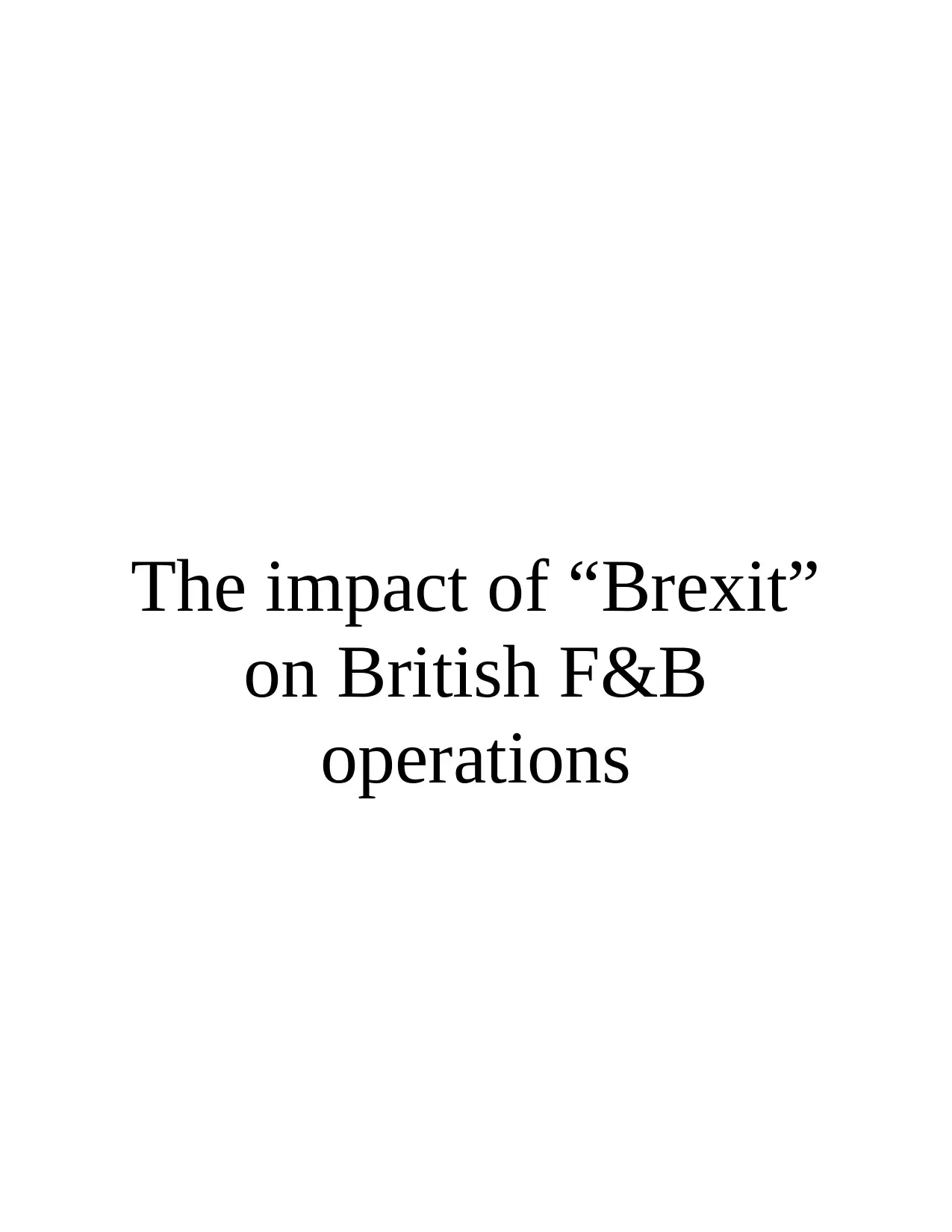
The impact of “Brexit”
on British F&B
operations
on British F&B
operations
Secure Best Marks with AI Grader
Need help grading? Try our AI Grader for instant feedback on your assignments.
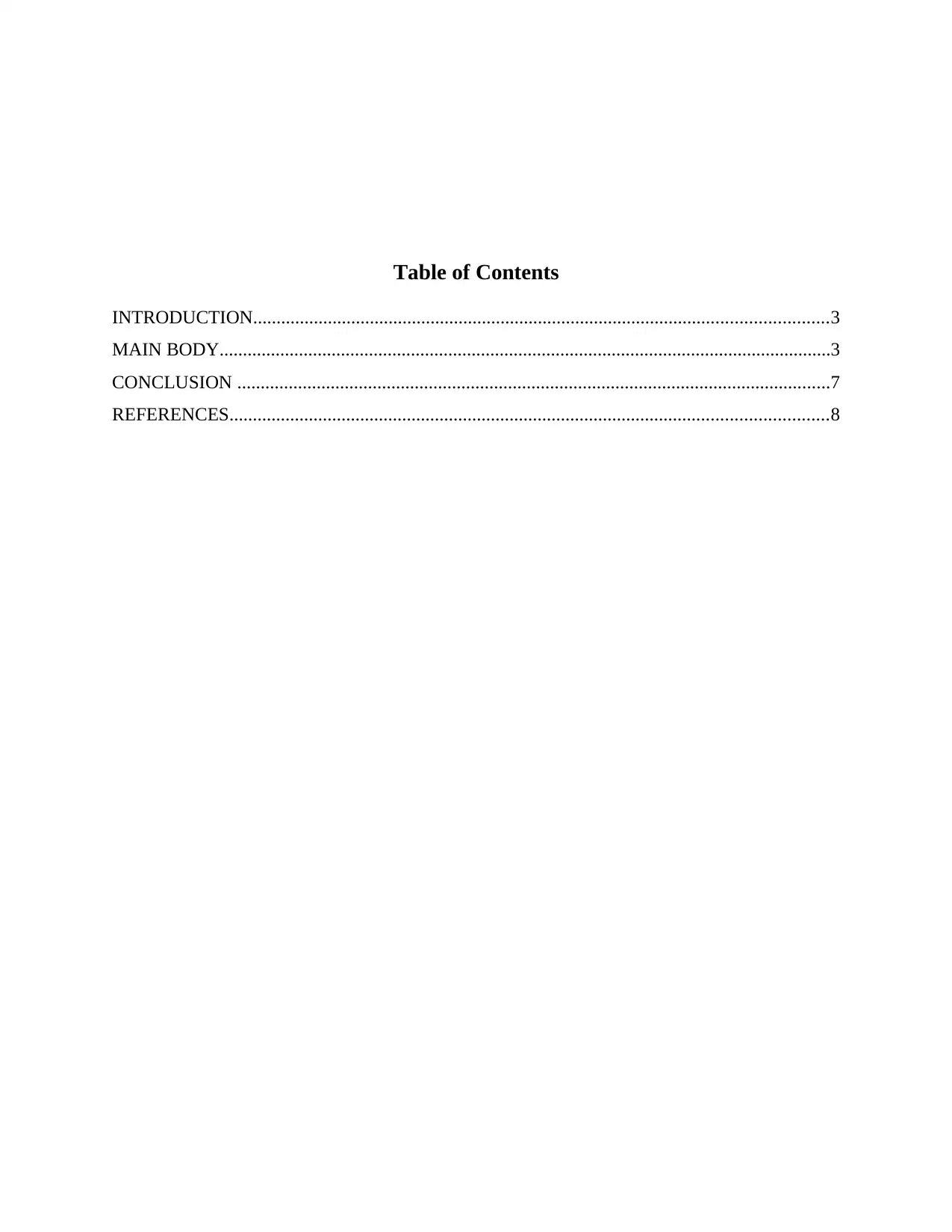
Table of Contents
INTRODUCTION...........................................................................................................................3
MAIN BODY...................................................................................................................................3
CONCLUSION ...............................................................................................................................7
REFERENCES................................................................................................................................8
INTRODUCTION...........................................................................................................................3
MAIN BODY...................................................................................................................................3
CONCLUSION ...............................................................................................................................7
REFERENCES................................................................................................................................8
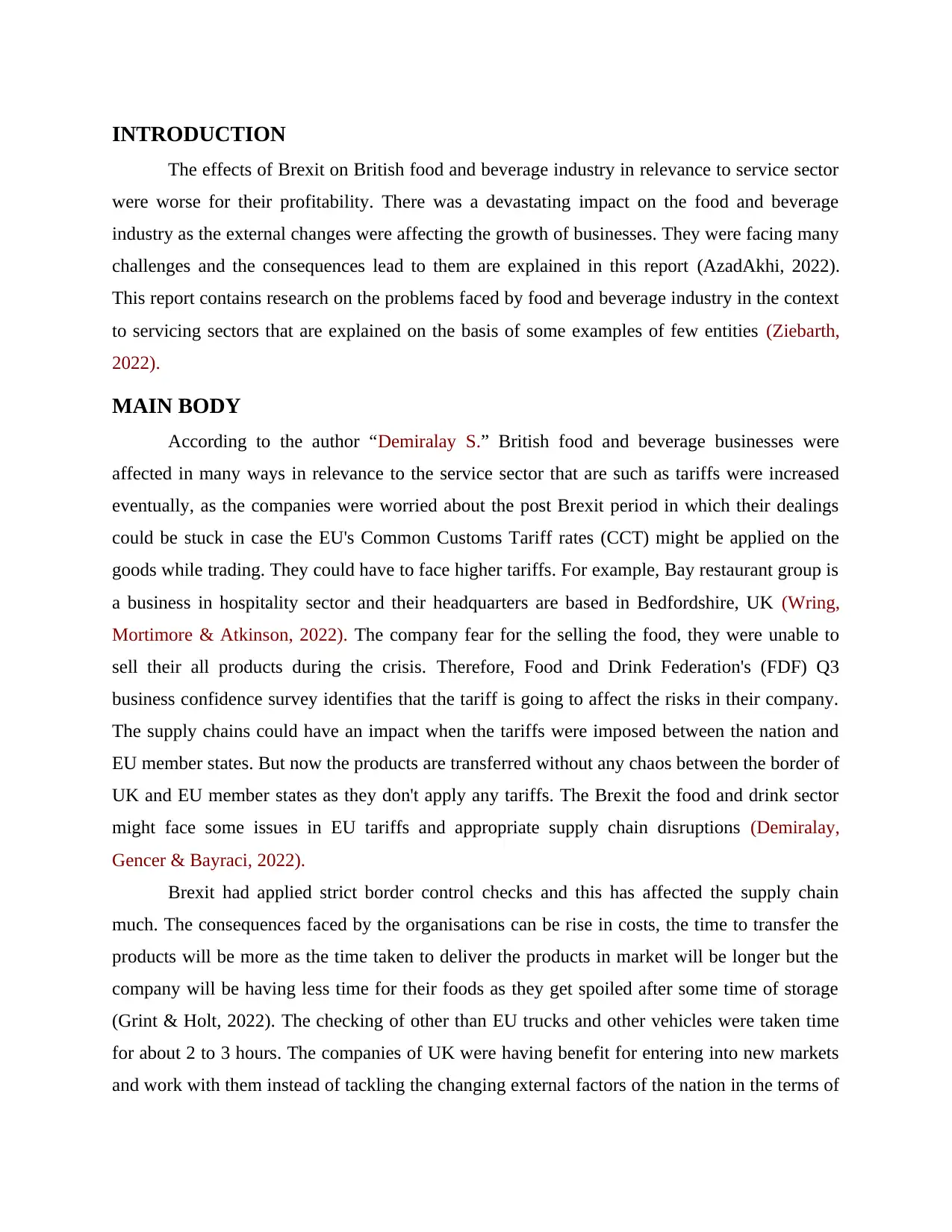
INTRODUCTION
The effects of Brexit on British food and beverage industry in relevance to service sector
were worse for their profitability. There was a devastating impact on the food and beverage
industry as the external changes were affecting the growth of businesses. They were facing many
challenges and the consequences lead to them are explained in this report (AzadAkhi, 2022).
This report contains research on the problems faced by food and beverage industry in the context
to servicing sectors that are explained on the basis of some examples of few entities (Ziebarth,
2022).
MAIN BODY
According to the author “Demiralay S.” British food and beverage businesses were
affected in many ways in relevance to the service sector that are such as tariffs were increased
eventually, as the companies were worried about the post Brexit period in which their dealings
could be stuck in case the EU's Common Customs Tariff rates (CCT) might be applied on the
goods while trading. They could have to face higher tariffs. For example, Bay restaurant group is
a business in hospitality sector and their headquarters are based in Bedfordshire, UK (Wring,
Mortimore & Atkinson, 2022). The company fear for the selling the food, they were unable to
sell their all products during the crisis. Therefore, Food and Drink Federation's (FDF) Q3
business confidence survey identifies that the tariff is going to affect the risks in their company.
The supply chains could have an impact when the tariffs were imposed between the nation and
EU member states. But now the products are transferred without any chaos between the border of
UK and EU member states as they don't apply any tariffs. The Brexit the food and drink sector
might face some issues in EU tariffs and appropriate supply chain disruptions (Demiralay,
Gencer & Bayraci, 2022).
Brexit had applied strict border control checks and this has affected the supply chain
much. The consequences faced by the organisations can be rise in costs, the time to transfer the
products will be more as the time taken to deliver the products in market will be longer but the
company will be having less time for their foods as they get spoiled after some time of storage
(Grint & Holt, 2022). The checking of other than EU trucks and other vehicles were taken time
for about 2 to 3 hours. The companies of UK were having benefit for entering into new markets
and work with them instead of tackling the changing external factors of the nation in the terms of
The effects of Brexit on British food and beverage industry in relevance to service sector
were worse for their profitability. There was a devastating impact on the food and beverage
industry as the external changes were affecting the growth of businesses. They were facing many
challenges and the consequences lead to them are explained in this report (AzadAkhi, 2022).
This report contains research on the problems faced by food and beverage industry in the context
to servicing sectors that are explained on the basis of some examples of few entities (Ziebarth,
2022).
MAIN BODY
According to the author “Demiralay S.” British food and beverage businesses were
affected in many ways in relevance to the service sector that are such as tariffs were increased
eventually, as the companies were worried about the post Brexit period in which their dealings
could be stuck in case the EU's Common Customs Tariff rates (CCT) might be applied on the
goods while trading. They could have to face higher tariffs. For example, Bay restaurant group is
a business in hospitality sector and their headquarters are based in Bedfordshire, UK (Wring,
Mortimore & Atkinson, 2022). The company fear for the selling the food, they were unable to
sell their all products during the crisis. Therefore, Food and Drink Federation's (FDF) Q3
business confidence survey identifies that the tariff is going to affect the risks in their company.
The supply chains could have an impact when the tariffs were imposed between the nation and
EU member states. But now the products are transferred without any chaos between the border of
UK and EU member states as they don't apply any tariffs. The Brexit the food and drink sector
might face some issues in EU tariffs and appropriate supply chain disruptions (Demiralay,
Gencer & Bayraci, 2022).
Brexit had applied strict border control checks and this has affected the supply chain
much. The consequences faced by the organisations can be rise in costs, the time to transfer the
products will be more as the time taken to deliver the products in market will be longer but the
company will be having less time for their foods as they get spoiled after some time of storage
(Grint & Holt, 2022). The checking of other than EU trucks and other vehicles were taken time
for about 2 to 3 hours. The companies of UK were having benefit for entering into new markets
and work with them instead of tackling the changing external factors of the nation in the terms of
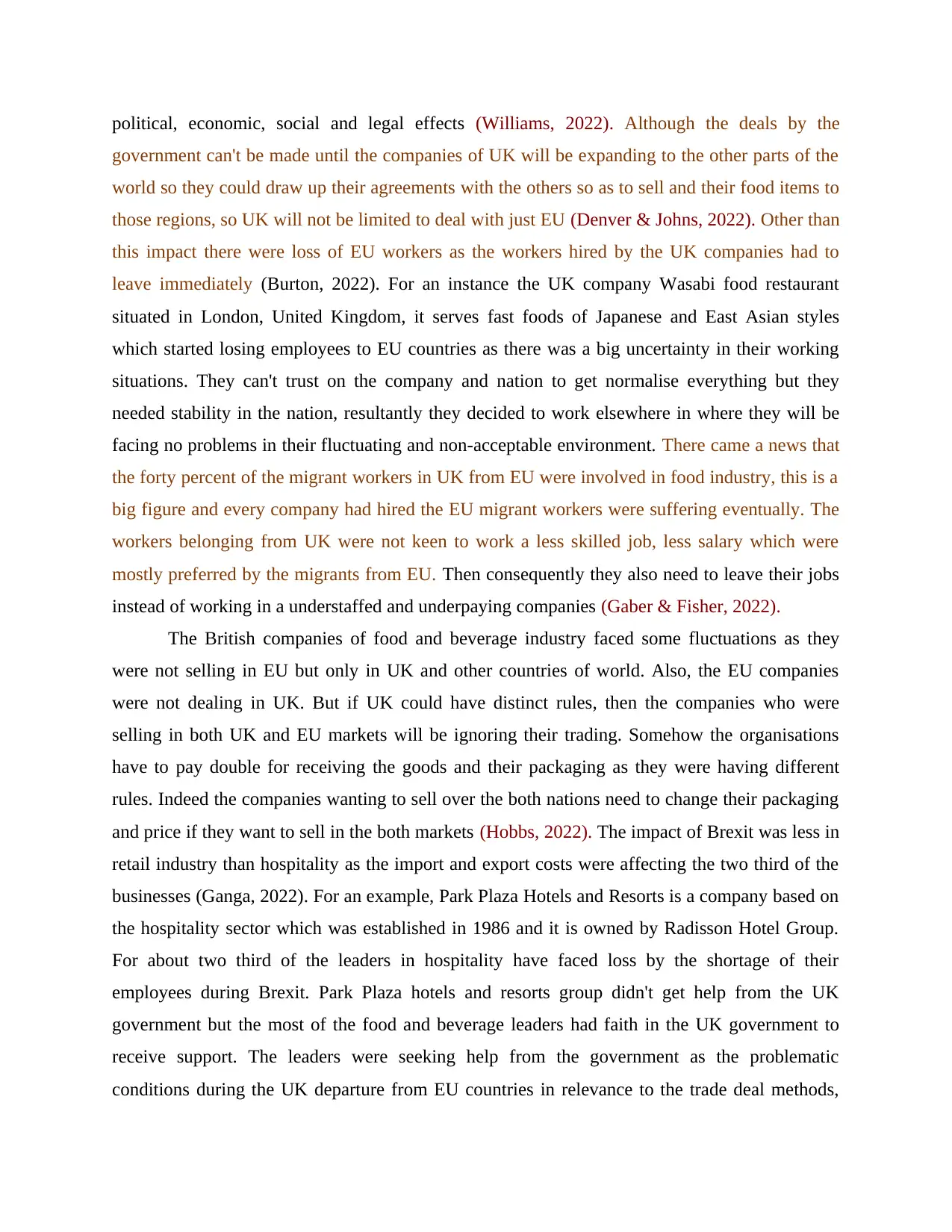
political, economic, social and legal effects (Williams, 2022). Although the deals by the
government can't be made until the companies of UK will be expanding to the other parts of the
world so they could draw up their agreements with the others so as to sell and their food items to
those regions, so UK will not be limited to deal with just EU (Denver & Johns, 2022). Other than
this impact there were loss of EU workers as the workers hired by the UK companies had to
leave immediately (Burton, 2022). For an instance the UK company Wasabi food restaurant
situated in London, United Kingdom, it serves fast foods of Japanese and East Asian styles
which started losing employees to EU countries as there was a big uncertainty in their working
situations. They can't trust on the company and nation to get normalise everything but they
needed stability in the nation, resultantly they decided to work elsewhere in where they will be
facing no problems in their fluctuating and non-acceptable environment. There came a news that
the forty percent of the migrant workers in UK from EU were involved in food industry, this is a
big figure and every company had hired the EU migrant workers were suffering eventually. The
workers belonging from UK were not keen to work a less skilled job, less salary which were
mostly preferred by the migrants from EU. Then consequently they also need to leave their jobs
instead of working in a understaffed and underpaying companies (Gaber & Fisher, 2022).
The British companies of food and beverage industry faced some fluctuations as they
were not selling in EU but only in UK and other countries of world. Also, the EU companies
were not dealing in UK. But if UK could have distinct rules, then the companies who were
selling in both UK and EU markets will be ignoring their trading. Somehow the organisations
have to pay double for receiving the goods and their packaging as they were having different
rules. Indeed the companies wanting to sell over the both nations need to change their packaging
and price if they want to sell in the both markets (Hobbs, 2022). The impact of Brexit was less in
retail industry than hospitality as the import and export costs were affecting the two third of the
businesses (Ganga, 2022). For an example, Park Plaza Hotels and Resorts is a company based on
the hospitality sector which was established in 1986 and it is owned by Radisson Hotel Group.
For about two third of the leaders in hospitality have faced loss by the shortage of their
employees during Brexit. Park Plaza hotels and resorts group didn't get help from the UK
government but the most of the food and beverage leaders had faith in the UK government to
receive support. The leaders were seeking help from the government as the problematic
conditions during the UK departure from EU countries in relevance to the trade deal methods,
government can't be made until the companies of UK will be expanding to the other parts of the
world so they could draw up their agreements with the others so as to sell and their food items to
those regions, so UK will not be limited to deal with just EU (Denver & Johns, 2022). Other than
this impact there were loss of EU workers as the workers hired by the UK companies had to
leave immediately (Burton, 2022). For an instance the UK company Wasabi food restaurant
situated in London, United Kingdom, it serves fast foods of Japanese and East Asian styles
which started losing employees to EU countries as there was a big uncertainty in their working
situations. They can't trust on the company and nation to get normalise everything but they
needed stability in the nation, resultantly they decided to work elsewhere in where they will be
facing no problems in their fluctuating and non-acceptable environment. There came a news that
the forty percent of the migrant workers in UK from EU were involved in food industry, this is a
big figure and every company had hired the EU migrant workers were suffering eventually. The
workers belonging from UK were not keen to work a less skilled job, less salary which were
mostly preferred by the migrants from EU. Then consequently they also need to leave their jobs
instead of working in a understaffed and underpaying companies (Gaber & Fisher, 2022).
The British companies of food and beverage industry faced some fluctuations as they
were not selling in EU but only in UK and other countries of world. Also, the EU companies
were not dealing in UK. But if UK could have distinct rules, then the companies who were
selling in both UK and EU markets will be ignoring their trading. Somehow the organisations
have to pay double for receiving the goods and their packaging as they were having different
rules. Indeed the companies wanting to sell over the both nations need to change their packaging
and price if they want to sell in the both markets (Hobbs, 2022). The impact of Brexit was less in
retail industry than hospitality as the import and export costs were affecting the two third of the
businesses (Ganga, 2022). For an example, Park Plaza Hotels and Resorts is a company based on
the hospitality sector which was established in 1986 and it is owned by Radisson Hotel Group.
For about two third of the leaders in hospitality have faced loss by the shortage of their
employees during Brexit. Park Plaza hotels and resorts group didn't get help from the UK
government but the most of the food and beverage leaders had faith in the UK government to
receive support. The leaders were seeking help from the government as the problematic
conditions during the UK departure from EU countries in relevance to the trade deal methods,
Secure Best Marks with AI Grader
Need help grading? Try our AI Grader for instant feedback on your assignments.
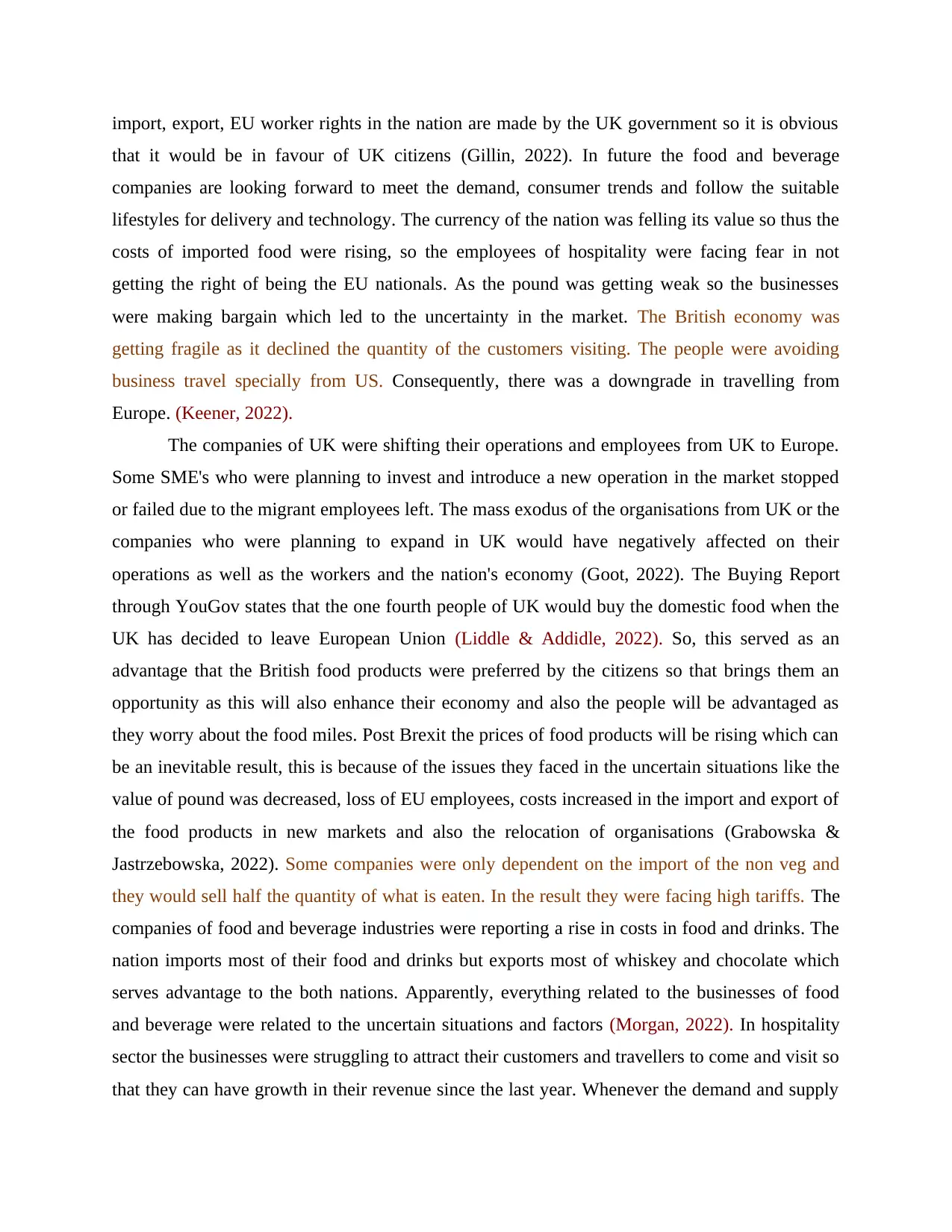
import, export, EU worker rights in the nation are made by the UK government so it is obvious
that it would be in favour of UK citizens (Gillin, 2022). In future the food and beverage
companies are looking forward to meet the demand, consumer trends and follow the suitable
lifestyles for delivery and technology. The currency of the nation was felling its value so thus the
costs of imported food were rising, so the employees of hospitality were facing fear in not
getting the right of being the EU nationals. As the pound was getting weak so the businesses
were making bargain which led to the uncertainty in the market. The British economy was
getting fragile as it declined the quantity of the customers visiting. The people were avoiding
business travel specially from US. Consequently, there was a downgrade in travelling from
Europe. (Keener, 2022).
The companies of UK were shifting their operations and employees from UK to Europe.
Some SME's who were planning to invest and introduce a new operation in the market stopped
or failed due to the migrant employees left. The mass exodus of the organisations from UK or the
companies who were planning to expand in UK would have negatively affected on their
operations as well as the workers and the nation's economy (Goot, 2022). The Buying Report
through YouGov states that the one fourth people of UK would buy the domestic food when the
UK has decided to leave European Union (Liddle & Addidle, 2022). So, this served as an
advantage that the British food products were preferred by the citizens so that brings them an
opportunity as this will also enhance their economy and also the people will be advantaged as
they worry about the food miles. Post Brexit the prices of food products will be rising which can
be an inevitable result, this is because of the issues they faced in the uncertain situations like the
value of pound was decreased, loss of EU employees, costs increased in the import and export of
the food products in new markets and also the relocation of organisations (Grabowska &
Jastrzebowska, 2022). Some companies were only dependent on the import of the non veg and
they would sell half the quantity of what is eaten. In the result they were facing high tariffs. The
companies of food and beverage industries were reporting a rise in costs in food and drinks. The
nation imports most of their food and drinks but exports most of whiskey and chocolate which
serves advantage to the both nations. Apparently, everything related to the businesses of food
and beverage were related to the uncertain situations and factors (Morgan, 2022). In hospitality
sector the businesses were struggling to attract their customers and travellers to come and visit so
that they can have growth in their revenue since the last year. Whenever the demand and supply
that it would be in favour of UK citizens (Gillin, 2022). In future the food and beverage
companies are looking forward to meet the demand, consumer trends and follow the suitable
lifestyles for delivery and technology. The currency of the nation was felling its value so thus the
costs of imported food were rising, so the employees of hospitality were facing fear in not
getting the right of being the EU nationals. As the pound was getting weak so the businesses
were making bargain which led to the uncertainty in the market. The British economy was
getting fragile as it declined the quantity of the customers visiting. The people were avoiding
business travel specially from US. Consequently, there was a downgrade in travelling from
Europe. (Keener, 2022).
The companies of UK were shifting their operations and employees from UK to Europe.
Some SME's who were planning to invest and introduce a new operation in the market stopped
or failed due to the migrant employees left. The mass exodus of the organisations from UK or the
companies who were planning to expand in UK would have negatively affected on their
operations as well as the workers and the nation's economy (Goot, 2022). The Buying Report
through YouGov states that the one fourth people of UK would buy the domestic food when the
UK has decided to leave European Union (Liddle & Addidle, 2022). So, this served as an
advantage that the British food products were preferred by the citizens so that brings them an
opportunity as this will also enhance their economy and also the people will be advantaged as
they worry about the food miles. Post Brexit the prices of food products will be rising which can
be an inevitable result, this is because of the issues they faced in the uncertain situations like the
value of pound was decreased, loss of EU employees, costs increased in the import and export of
the food products in new markets and also the relocation of organisations (Grabowska &
Jastrzebowska, 2022). Some companies were only dependent on the import of the non veg and
they would sell half the quantity of what is eaten. In the result they were facing high tariffs. The
companies of food and beverage industries were reporting a rise in costs in food and drinks. The
nation imports most of their food and drinks but exports most of whiskey and chocolate which
serves advantage to the both nations. Apparently, everything related to the businesses of food
and beverage were related to the uncertain situations and factors (Morgan, 2022). In hospitality
sector the businesses were struggling to attract their customers and travellers to come and visit so
that they can have growth in their revenue since the last year. Whenever the demand and supply
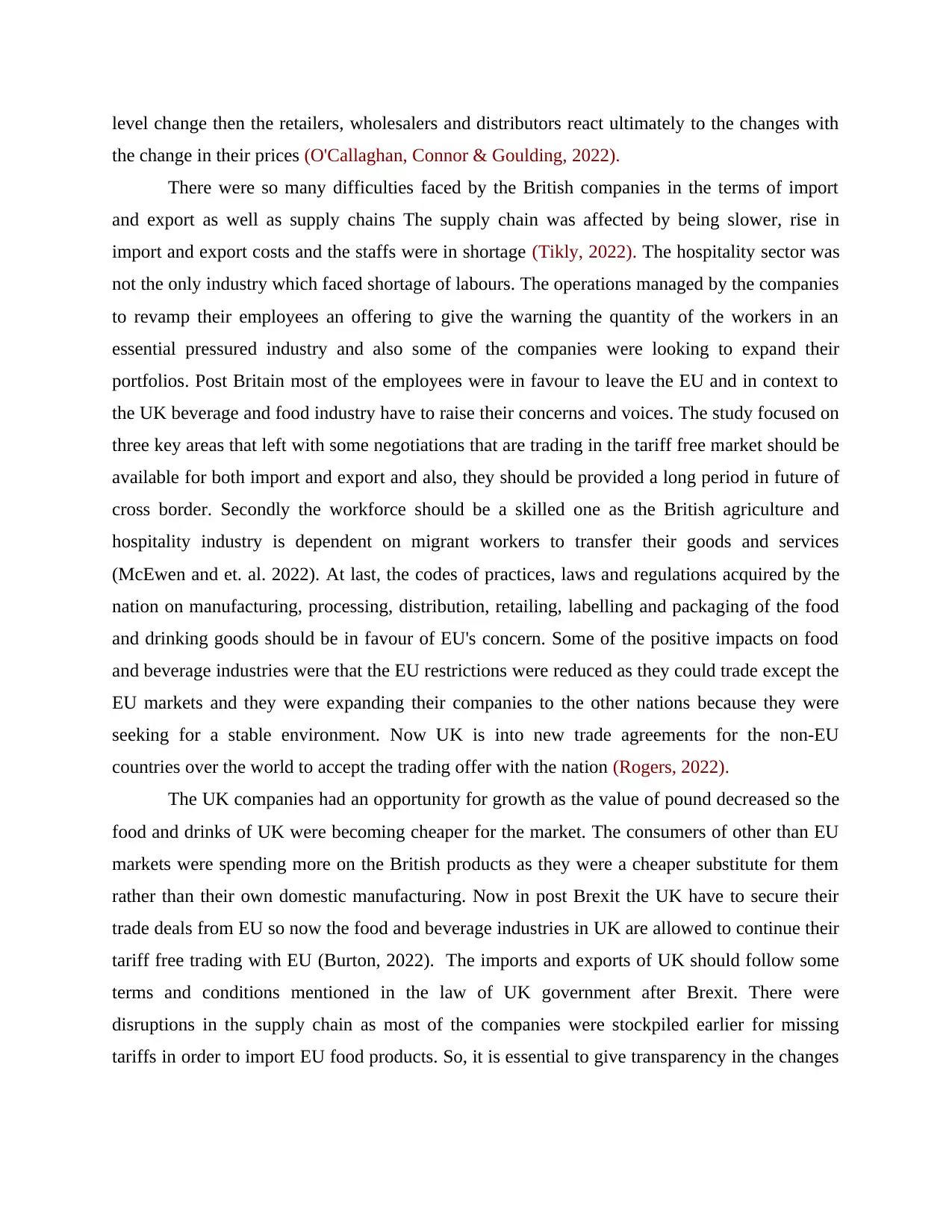
level change then the retailers, wholesalers and distributors react ultimately to the changes with
the change in their prices (O'Callaghan, Connor & Goulding, 2022).
There were so many difficulties faced by the British companies in the terms of import
and export as well as supply chains The supply chain was affected by being slower, rise in
import and export costs and the staffs were in shortage (Tikly, 2022). The hospitality sector was
not the only industry which faced shortage of labours. The operations managed by the companies
to revamp their employees an offering to give the warning the quantity of the workers in an
essential pressured industry and also some of the companies were looking to expand their
portfolios. Post Britain most of the employees were in favour to leave the EU and in context to
the UK beverage and food industry have to raise their concerns and voices. The study focused on
three key areas that left with some negotiations that are trading in the tariff free market should be
available for both import and export and also, they should be provided a long period in future of
cross border. Secondly the workforce should be a skilled one as the British agriculture and
hospitality industry is dependent on migrant workers to transfer their goods and services
(McEwen and et. al. 2022). At last, the codes of practices, laws and regulations acquired by the
nation on manufacturing, processing, distribution, retailing, labelling and packaging of the food
and drinking goods should be in favour of EU's concern. Some of the positive impacts on food
and beverage industries were that the EU restrictions were reduced as they could trade except the
EU markets and they were expanding their companies to the other nations because they were
seeking for a stable environment. Now UK is into new trade agreements for the non-EU
countries over the world to accept the trading offer with the nation (Rogers, 2022).
The UK companies had an opportunity for growth as the value of pound decreased so the
food and drinks of UK were becoming cheaper for the market. The consumers of other than EU
markets were spending more on the British products as they were a cheaper substitute for them
rather than their own domestic manufacturing. Now in post Brexit the UK have to secure their
trade deals from EU so now the food and beverage industries in UK are allowed to continue their
tariff free trading with EU (Burton, 2022). The imports and exports of UK should follow some
terms and conditions mentioned in the law of UK government after Brexit. There were
disruptions in the supply chain as most of the companies were stockpiled earlier for missing
tariffs in order to import EU food products. So, it is essential to give transparency in the changes
the change in their prices (O'Callaghan, Connor & Goulding, 2022).
There were so many difficulties faced by the British companies in the terms of import
and export as well as supply chains The supply chain was affected by being slower, rise in
import and export costs and the staffs were in shortage (Tikly, 2022). The hospitality sector was
not the only industry which faced shortage of labours. The operations managed by the companies
to revamp their employees an offering to give the warning the quantity of the workers in an
essential pressured industry and also some of the companies were looking to expand their
portfolios. Post Britain most of the employees were in favour to leave the EU and in context to
the UK beverage and food industry have to raise their concerns and voices. The study focused on
three key areas that left with some negotiations that are trading in the tariff free market should be
available for both import and export and also, they should be provided a long period in future of
cross border. Secondly the workforce should be a skilled one as the British agriculture and
hospitality industry is dependent on migrant workers to transfer their goods and services
(McEwen and et. al. 2022). At last, the codes of practices, laws and regulations acquired by the
nation on manufacturing, processing, distribution, retailing, labelling and packaging of the food
and drinking goods should be in favour of EU's concern. Some of the positive impacts on food
and beverage industries were that the EU restrictions were reduced as they could trade except the
EU markets and they were expanding their companies to the other nations because they were
seeking for a stable environment. Now UK is into new trade agreements for the non-EU
countries over the world to accept the trading offer with the nation (Rogers, 2022).
The UK companies had an opportunity for growth as the value of pound decreased so the
food and drinks of UK were becoming cheaper for the market. The consumers of other than EU
markets were spending more on the British products as they were a cheaper substitute for them
rather than their own domestic manufacturing. Now in post Brexit the UK have to secure their
trade deals from EU so now the food and beverage industries in UK are allowed to continue their
tariff free trading with EU (Burton, 2022). The imports and exports of UK should follow some
terms and conditions mentioned in the law of UK government after Brexit. There were
disruptions in the supply chain as most of the companies were stockpiled earlier for missing
tariffs in order to import EU food products. So, it is essential to give transparency in the changes
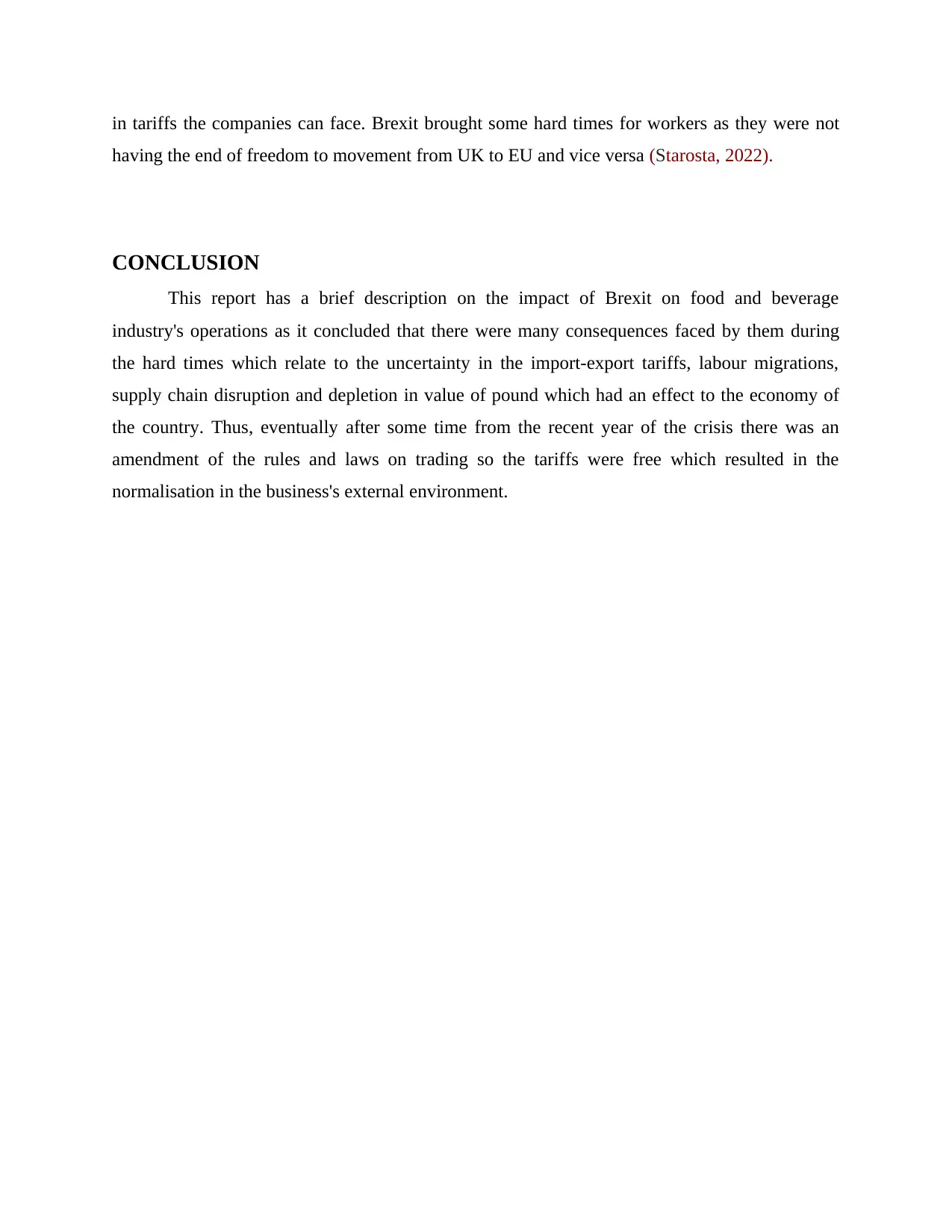
in tariffs the companies can face. Brexit brought some hard times for workers as they were not
having the end of freedom to movement from UK to EU and vice versa (Starosta, 2022).
CONCLUSION
This report has a brief description on the impact of Brexit on food and beverage
industry's operations as it concluded that there were many consequences faced by them during
the hard times which relate to the uncertainty in the import-export tariffs, labour migrations,
supply chain disruption and depletion in value of pound which had an effect to the economy of
the country. Thus, eventually after some time from the recent year of the crisis there was an
amendment of the rules and laws on trading so the tariffs were free which resulted in the
normalisation in the business's external environment.
having the end of freedom to movement from UK to EU and vice versa (Starosta, 2022).
CONCLUSION
This report has a brief description on the impact of Brexit on food and beverage
industry's operations as it concluded that there were many consequences faced by them during
the hard times which relate to the uncertainty in the import-export tariffs, labour migrations,
supply chain disruption and depletion in value of pound which had an effect to the economy of
the country. Thus, eventually after some time from the recent year of the crisis there was an
amendment of the rules and laws on trading so the tariffs were free which resulted in the
normalisation in the business's external environment.
Paraphrase This Document
Need a fresh take? Get an instant paraphrase of this document with our AI Paraphraser
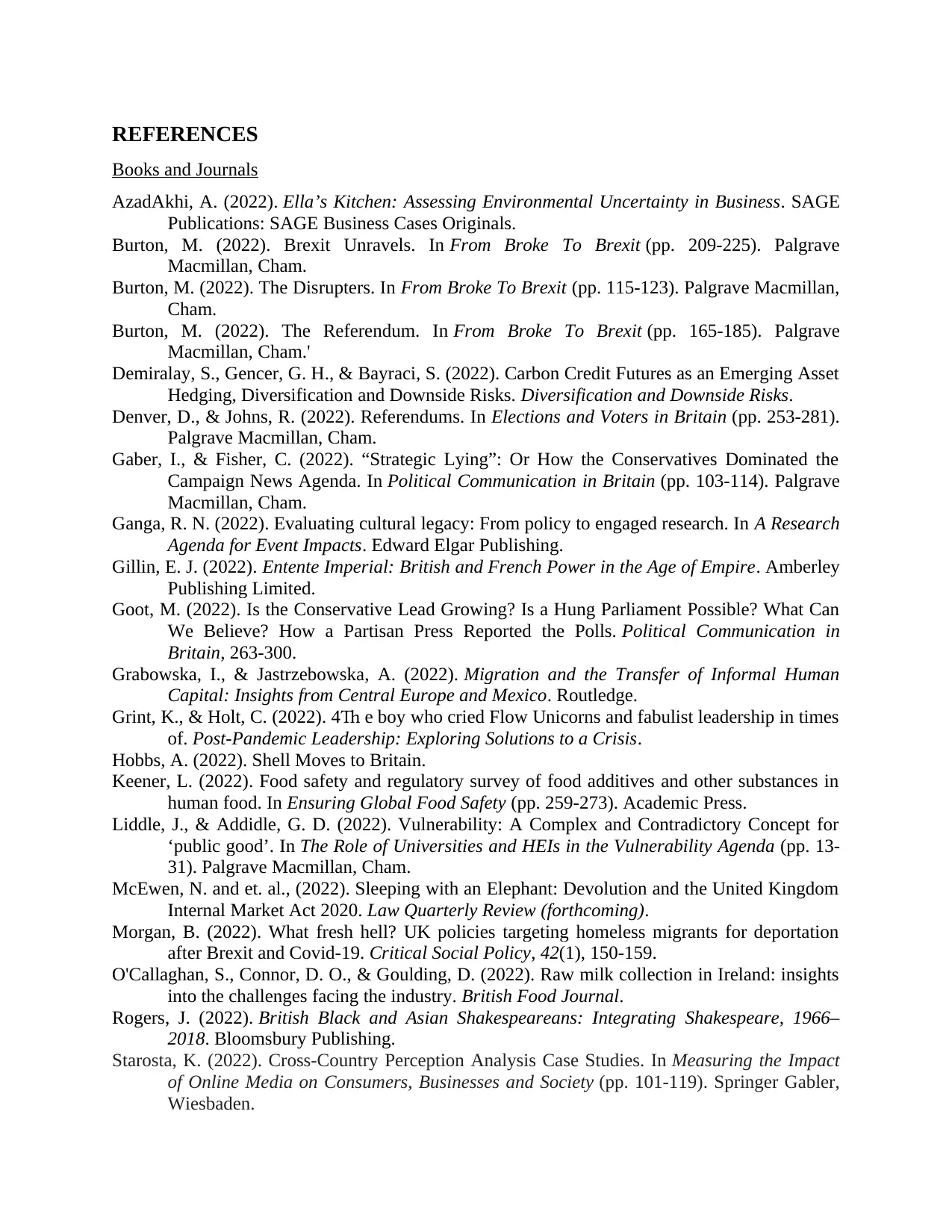
REFERENCES
Books and Journals
AzadAkhi, A. (2022). Ella’s Kitchen: Assessing Environmental Uncertainty in Business. SAGE
Publications: SAGE Business Cases Originals.
Burton, M. (2022). Brexit Unravels. In From Broke To Brexit (pp. 209-225). Palgrave
Macmillan, Cham.
Burton, M. (2022). The Disrupters. In From Broke To Brexit (pp. 115-123). Palgrave Macmillan,
Cham.
Burton, M. (2022). The Referendum. In From Broke To Brexit (pp. 165-185). Palgrave
Macmillan, Cham.'
Demiralay, S., Gencer, G. H., & Bayraci, S. (2022). Carbon Credit Futures as an Emerging Asset
Hedging, Diversification and Downside Risks. Diversification and Downside Risks.
Denver, D., & Johns, R. (2022). Referendums. In Elections and Voters in Britain (pp. 253-281).
Palgrave Macmillan, Cham.
Gaber, I., & Fisher, C. (2022). “Strategic Lying”: Or How the Conservatives Dominated the
Campaign News Agenda. In Political Communication in Britain (pp. 103-114). Palgrave
Macmillan, Cham.
Ganga, R. N. (2022). Evaluating cultural legacy: From policy to engaged research. In A Research
Agenda for Event Impacts. Edward Elgar Publishing.
Gillin, E. J. (2022). Entente Imperial: British and French Power in the Age of Empire. Amberley
Publishing Limited.
Goot, M. (2022). Is the Conservative Lead Growing? Is a Hung Parliament Possible? What Can
We Believe? How a Partisan Press Reported the Polls. Political Communication in
Britain, 263-300.
Grabowska, I., & Jastrzebowska, A. (2022). Migration and the Transfer of Informal Human
Capital: Insights from Central Europe and Mexico. Routledge.
Grint, K., & Holt, C. (2022). 4 e boy who cried Flow Unicorns and fabulist leadership in times
of. Post-Pandemic Leadership: Exploring Solutions to a Crisis.
Hobbs, A. (2022). Shell Moves to Britain.
Keener, L. (2022). Food safety and regulatory survey of food additives and other substances in
human food. In Ensuring Global Food Safety (pp. 259-273). Academic Press.
Liddle, J., & Addidle, G. D. (2022). Vulnerability: A Complex and Contradictory Concept for
‘public good’. In The Role of Universities and HEIs in the Vulnerability Agenda (pp. 13-
31). Palgrave Macmillan, Cham.
McEwen, N. and et. al., (2022). Sleeping with an Elephant: Devolution and the United Kingdom
Internal Market Act 2020. Law Quarterly Review (forthcoming).
Morgan, B. (2022). What fresh hell? UK policies targeting homeless migrants for deportation
after Brexit and Covid-19. Critical Social Policy, 42(1), 150-159.
O'Callaghan, S., Connor, D. O., & Goulding, D. (2022). Raw milk collection in Ireland: insights
into the challenges facing the industry. British Food Journal.
Rogers, J. (2022). British Black and Asian Shakespeareans: Integrating Shakespeare, 1966–
2018. Bloomsbury Publishing.
Starosta, K. (2022). Cross-Country Perception Analysis Case Studies. In Measuring the Impact
of Online Media on Consumers, Businesses and Society (pp. 101-119). Springer Gabler,
Wiesbaden.
Books and Journals
AzadAkhi, A. (2022). Ella’s Kitchen: Assessing Environmental Uncertainty in Business. SAGE
Publications: SAGE Business Cases Originals.
Burton, M. (2022). Brexit Unravels. In From Broke To Brexit (pp. 209-225). Palgrave
Macmillan, Cham.
Burton, M. (2022). The Disrupters. In From Broke To Brexit (pp. 115-123). Palgrave Macmillan,
Cham.
Burton, M. (2022). The Referendum. In From Broke To Brexit (pp. 165-185). Palgrave
Macmillan, Cham.'
Demiralay, S., Gencer, G. H., & Bayraci, S. (2022). Carbon Credit Futures as an Emerging Asset
Hedging, Diversification and Downside Risks. Diversification and Downside Risks.
Denver, D., & Johns, R. (2022). Referendums. In Elections and Voters in Britain (pp. 253-281).
Palgrave Macmillan, Cham.
Gaber, I., & Fisher, C. (2022). “Strategic Lying”: Or How the Conservatives Dominated the
Campaign News Agenda. In Political Communication in Britain (pp. 103-114). Palgrave
Macmillan, Cham.
Ganga, R. N. (2022). Evaluating cultural legacy: From policy to engaged research. In A Research
Agenda for Event Impacts. Edward Elgar Publishing.
Gillin, E. J. (2022). Entente Imperial: British and French Power in the Age of Empire. Amberley
Publishing Limited.
Goot, M. (2022). Is the Conservative Lead Growing? Is a Hung Parliament Possible? What Can
We Believe? How a Partisan Press Reported the Polls. Political Communication in
Britain, 263-300.
Grabowska, I., & Jastrzebowska, A. (2022). Migration and the Transfer of Informal Human
Capital: Insights from Central Europe and Mexico. Routledge.
Grint, K., & Holt, C. (2022). 4 e boy who cried Flow Unicorns and fabulist leadership in times
of. Post-Pandemic Leadership: Exploring Solutions to a Crisis.
Hobbs, A. (2022). Shell Moves to Britain.
Keener, L. (2022). Food safety and regulatory survey of food additives and other substances in
human food. In Ensuring Global Food Safety (pp. 259-273). Academic Press.
Liddle, J., & Addidle, G. D. (2022). Vulnerability: A Complex and Contradictory Concept for
‘public good’. In The Role of Universities and HEIs in the Vulnerability Agenda (pp. 13-
31). Palgrave Macmillan, Cham.
McEwen, N. and et. al., (2022). Sleeping with an Elephant: Devolution and the United Kingdom
Internal Market Act 2020. Law Quarterly Review (forthcoming).
Morgan, B. (2022). What fresh hell? UK policies targeting homeless migrants for deportation
after Brexit and Covid-19. Critical Social Policy, 42(1), 150-159.
O'Callaghan, S., Connor, D. O., & Goulding, D. (2022). Raw milk collection in Ireland: insights
into the challenges facing the industry. British Food Journal.
Rogers, J. (2022). British Black and Asian Shakespeareans: Integrating Shakespeare, 1966–
2018. Bloomsbury Publishing.
Starosta, K. (2022). Cross-Country Perception Analysis Case Studies. In Measuring the Impact
of Online Media on Consumers, Businesses and Society (pp. 101-119). Springer Gabler,
Wiesbaden.
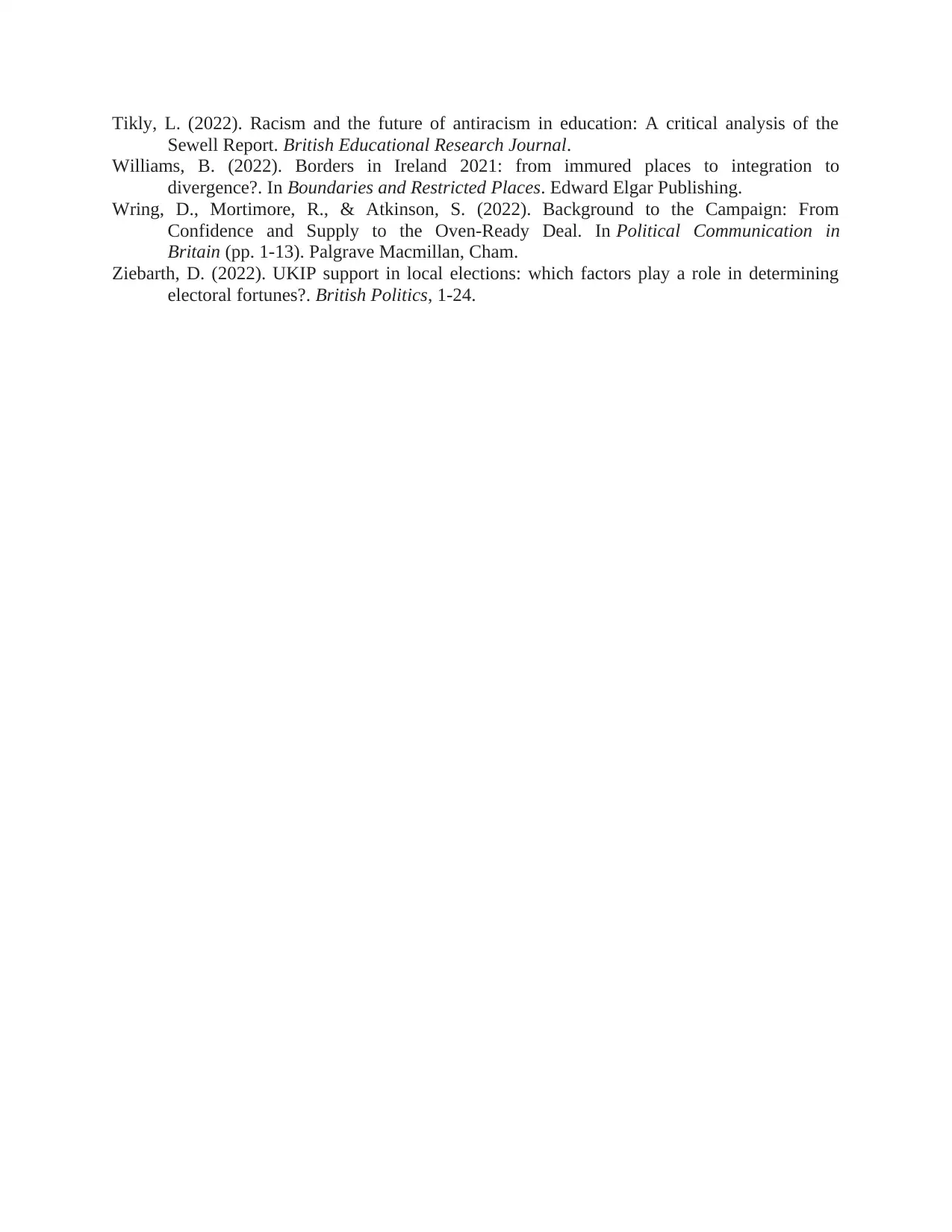
Tikly, L. (2022). Racism and the future of antiracism in education: A critical analysis of the
Sewell Report. British Educational Research Journal.
Williams, B. (2022). Borders in Ireland 2021: from immured places to integration to
divergence?. In Boundaries and Restricted Places. Edward Elgar Publishing.
Wring, D., Mortimore, R., & Atkinson, S. (2022). Background to the Campaign: From
Confidence and Supply to the Oven-Ready Deal. In Political Communication in
Britain (pp. 1-13). Palgrave Macmillan, Cham.
Ziebarth, D. (2022). UKIP support in local elections: which factors play a role in determining
electoral fortunes?. British Politics, 1-24.
Sewell Report. British Educational Research Journal.
Williams, B. (2022). Borders in Ireland 2021: from immured places to integration to
divergence?. In Boundaries and Restricted Places. Edward Elgar Publishing.
Wring, D., Mortimore, R., & Atkinson, S. (2022). Background to the Campaign: From
Confidence and Supply to the Oven-Ready Deal. In Political Communication in
Britain (pp. 1-13). Palgrave Macmillan, Cham.
Ziebarth, D. (2022). UKIP support in local elections: which factors play a role in determining
electoral fortunes?. British Politics, 1-24.
1 out of 9
Related Documents
Your All-in-One AI-Powered Toolkit for Academic Success.
+13062052269
info@desklib.com
Available 24*7 on WhatsApp / Email
![[object Object]](/_next/static/media/star-bottom.7253800d.svg)
Unlock your academic potential
© 2024 | Zucol Services PVT LTD | All rights reserved.





